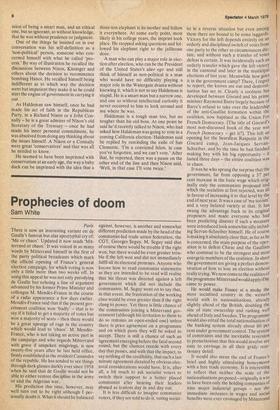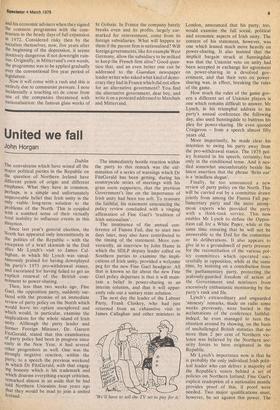Prophecies of doom
Sam White
Paris There is now an interesting variant on de Gaulle's famous but alas apocryphal cry of: `Me or chaos'. Updated it now reads `Mitterrand or chaos.' It was voiced in so many words by Mitterrand himself in the first of the party political broadcasts which mark the official opening of France's general election campaign, for which voting is now only a little more than two weeks off. In using this appeal he was not only parodying de Gaulle but echoing a line of argument advanced by his former Prime Minister and colleague M. Mendes-France in the course of a radio appearance a few days earlier. Mendes-France said that if the present government coalition won `badly' — that is to say if it failed to get a majority of votes but won a majority of seats — then there would be a great upsurge of rage in the country which would lead to `chaos'. M. MendesFrance, who is not taking an active part in the campaign and who regards Mitterrand with grave if unspoken misgivings, is now twenty-five years after he last held office, firmly established as the resident Cassandra of the republic. He has tended to see things through dark glasses darkly ever since 1958 when he said that de Gaulle would not be able to either restore discipline in the army or end the Algerian war.
His prediction this time, however, may well turn out to be right although I personally doubt it. What it should be balanced against, however, is another and somewhat different prediction made by the head of the communist-led trade union federation, the CGT, Georges Seguy. M. Seguy said that of course there would be trouble if the right won, but there would be even greater trouble if the left won and did not immediately fulfil all its electoral promises. Anyone who knows how to read communist statements as they are intended to be read will realise that his threat was directed against a left government which did not include the communists. M. Seguy went on to say that, in that event, the frustration of the working class would be even greater than if the right clung to power. Yet there is little chance of the communists joining a Mitterrand government (although his invitation to them to do so remains an open-ended one) unless there is prior agreement on a programme and on which posts they will be asked to accept. There is still a chance of such an agreement emerging before the fatal second round, but the chances recede with every day that passes, and with that the impact, to say nothing of the credibility, that such a last minute agreement dictated by obvious electoral considerations would have. It is, after all, a bit much to ask socialist voters to switch their support to a better placed communist alter hearing their leaders abused as traitors day in and day out.
It is less difficult to imagine communist voters, if they are told to do it, voting social ist in a reverse situation but even among them there are bound to be some laggards. Victory for the left depends entirely on an orderly and disciplined switch of votes from one party to the other as circumstances dictate, and without such a transfer of votes defeat is certain. It was incidentally such an orderly transfer which gave the left victory in the cantonal and later in the municipal elections of last year. Meanwhile how goes it in the government camp? There, I regret to report, the knives are out and demoralisation has set in. Clearly a coolness has developed between Giscard and his prime minister Raymond Barre largely because of Barre's refusal to take over the leadership of the anti-Gaullist formation within the coalition, now baptised as the Union For French Democracy. (The title of Giscard's most non-discussed book of the year was French Democracy — get it?). This left an opening for the beardless Rasputin in the Giscard camp, Jean-Jacques ServanSchreiber, and by the time he had finished making hay with his big opportunity — it lasted three days — the entire coalition was in chaos.
It was he who sprung the surprise that the government, far from opposing a 37 per cent increase in the basic wage which originally only, the communists proposed and which the socialists at first rejected, was all in favour of increasing it to that level by the, end of next year. It was a case of 'me tooism and a very belated variety at that. It has swung the advantage back to its original proposers and made everyone who had been predicting disaster if such a measure were introduced look somewhat silly including Servan-Schreiber himself. He of course is making it absolutely clear that, as far as he is concerned, the main purpose of the operation is to defeat Chirac and the Gaullists who continue to be the strongest and most energetic members of the coalition. In short the government are giving a perfect demonstration of how to lose an election without really trying. We now come to the realities of the programme Mitterrand would apply if he came to power.
He would make France at a stroke the most socialised country in the western world with its nationalisations, already slightly ahead of the British, doubling the size of state ownership and rushing well ahead of Italy and Sweden. The programme would also entail the total nationalisation of the banking system already about 80 per cent under government control. The system of constraints and the inevitable reversion to protectionism that this would involve are easy to envisage in all their grisly reactionary detail. It would also mean the end of France's brief and highly stimulating honeymoon with a free trade economy. It is interesting to reflect that neither the scale of the nationalisations proposed —originally it was to have been only the holding companies of nine major industrial groups — nor the immediate increases-, in wages and social benefits were ever envisaged by Mitterrand
and his economic advisers when they signed the common programme with the communists in the heady days of full expansion m 1972. Considered risky then by the socialists themselves, now, five years after the beginning of the depression, it seems Positively dangerous if not downright ruinous. Originally, in Mitterrand's own words, the programme was to be applied gradually over the conventional five year period of legislature.
Now it will come with a rush and this is entirely due to communist pressure. I note incidentally a touching cri de coeur from one of the companies threatened with nationalisation: the famous glass works of
St Gobain. In France the company barely breaks even and its profits, largely earmarked for reinvestment, come from its foreign subsidiaries. What will happen to them if the parent firm is nationalised? Will foreign governments, like for example West Germany, allow the subsidiary to be milked to keep the French firm alive? Good question that, and an even better one can be addressed to the Guardian newspaper leader writer who asked what kind of democracy they had in France which did not allow for an alternative government? You find the alternative government, dear boy, and write it on a postcard addressed to Marchais and Mitterrand.



































 Previous page
Previous page